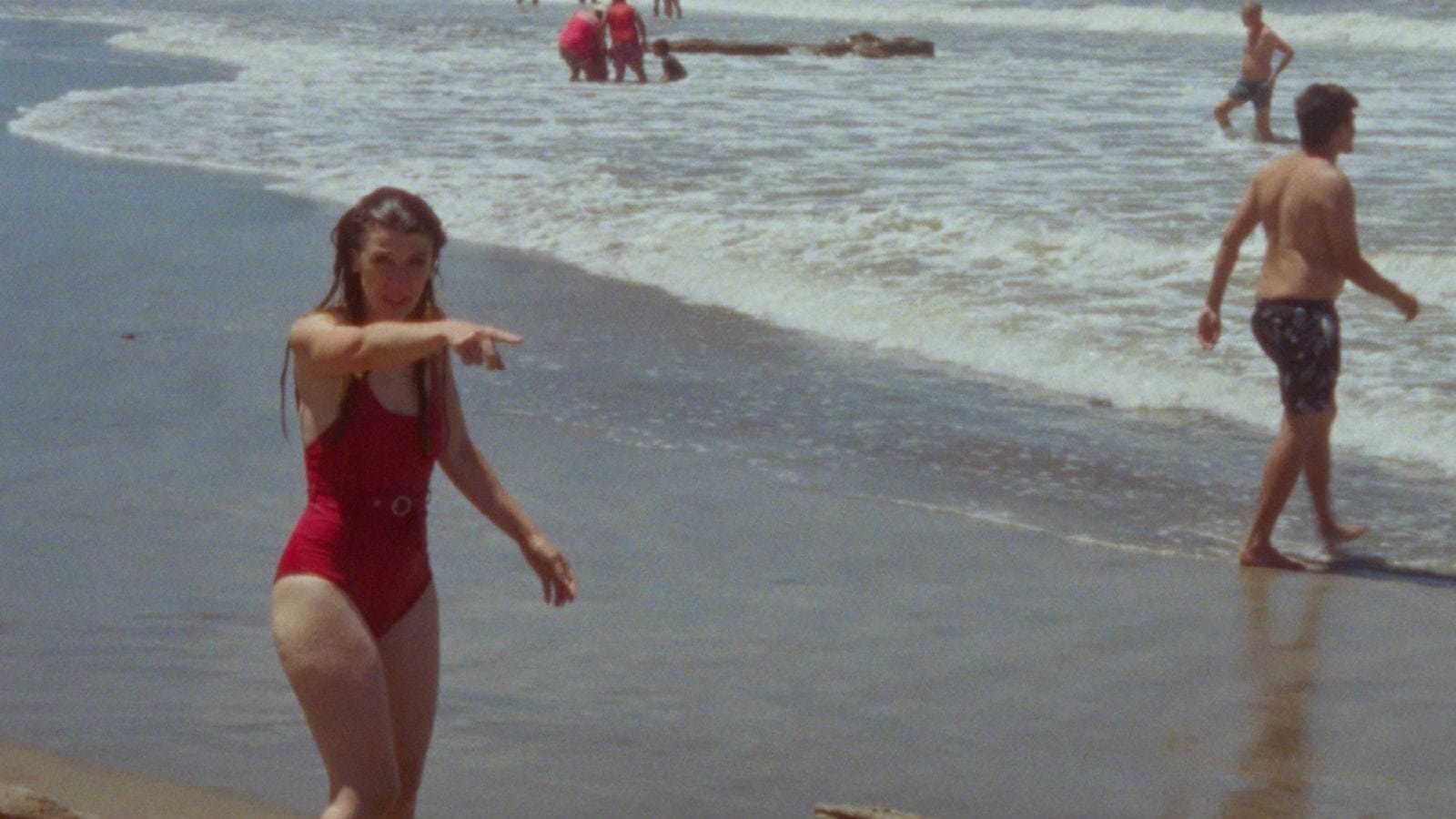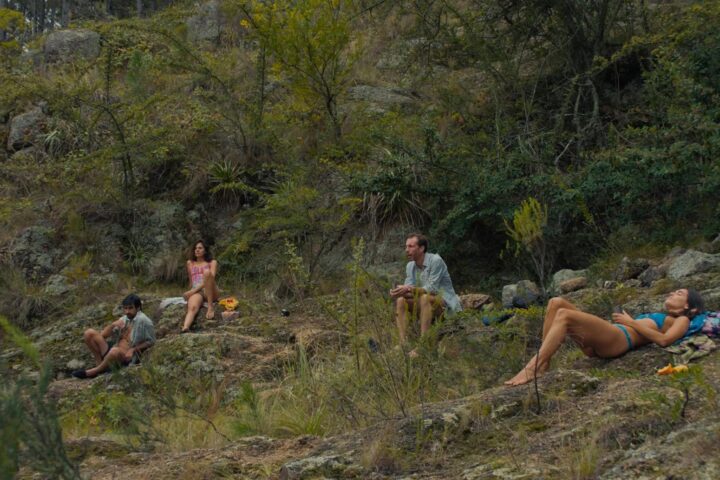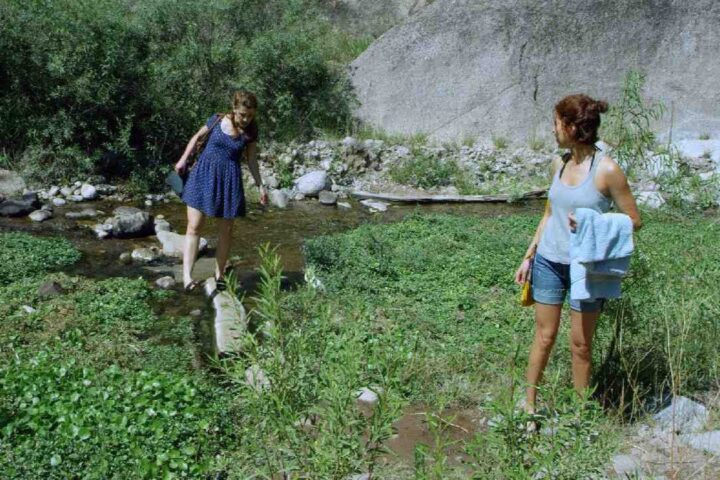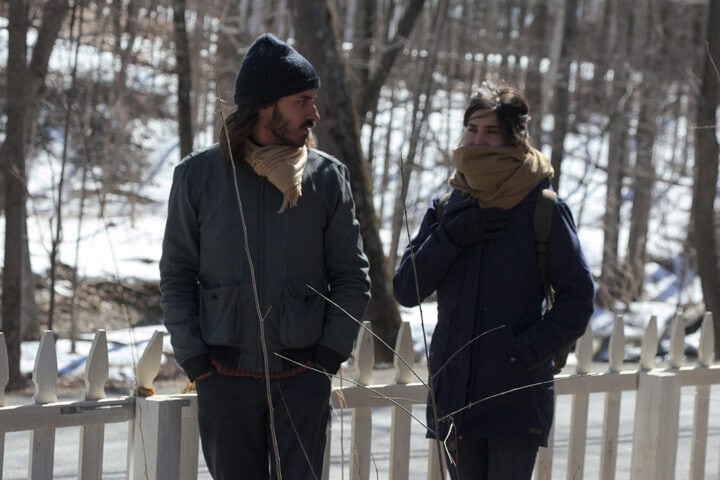Argentine writer-director Matías Piñeiro’s You Burn Me is an intimate, impressionistic adaptation of the “Sea Foam” section from Italian modernist poet Cesare Pavese’s Dialogues with Leucò. It’s one of several segments from Pavese’s 1947 book that stages a philosophical dialogue between figures of Greek mythology.
“Sea Form” specifically imagines a conversation between Sappho (Gabriela Saidón), the lyric poet of Lesbos, and the mountain nymph Britomartis (María Villar). They have much to discuss, both having thrown themselves into the sea—the former out of unrequited desire for the ferryman Phaon, the latter to escape the unwanted attentions of Minos. Splicing in a handful of Sappho’s surviving fragmentary poems and a parallel story that follows a lovestruck biology student (Maria Inês Conçalves), Piñeiro expands Pavese’s dialogue into an intertextual conversation on the nature of love and desire, death and memory, silence and expression.
Poetry, not a fundamentally narrative medium, invites a more abstract, experimental process of adaptation than novels or short fiction, one that challenges filmmakers to find equivalents between figurative and cinematic language. Piñeiro’s approach with You Burn Me is doubly literal, juxtaposing shots of text on the page with visual “translations.”
In its use of montage to create chains of association between its 16mm images, You Burn Me recalls Maya Deren’s cryptic and repetitious Meshes of the Afternoon and the cinécriture of Agnès Varda’s L’opéra Mouffe—maybe even Stan Brakhage to some extent. In addition to the serial arrangement images, Piñeiro layers varied genres and media—myth, translation, poetry, illustration, doodling, marginalia—to create a palimpsest of meaning.
How Piñeiro translates Sappho’s fragment “Para mí, ni la miel ni la abeja” (also rendered in English by the film as “For me, not the honey not the bee”) typifies his approach. He accompanies each word, recited in voiceover, with a brief shot. “Para” (“for”), for instance, is rendered as water droplets rippling the pool at the base of a fountain, while “Mí” (“me”) is a hand struggling with the key in a door stubbornly locked. “Miel” (“honey”) is a close-up of sea foam coursing over rocks—a reference to the foam from Uranus’s severed genitals from which Aphrodite was born—and “abeja” (“bee”) as a graffito of the insect.

The sequence repeats several times over and eventually the voiceover drops away, leaving the images in silence, yet by this point the linkages have become so ingrained that it’s tempting to recite the words internally as their equivalents reappear on screen. Finally, Piñeiro reshuffles the order of images to create new lines of poetry out of the same words.
Some of the associations are clearer than others, as in the case of “bee” rendered as a recognizable bee—albeit a celluloid image of a drawn image of one. Others are more oblique: How exactly does struggling to unlock a door signify “me”? Maybe Piñeiro envisions the self as isolated yet not without its ingresses and egresses, which can in a sense change its locks to determine who has access. Regardless, a constellation of images and metaphors arises around this single repeated line, evoking lack, desire, death, regeneration, and so on.
If You Burn Me comes across at times as unstructured despite the biographical sections on Pavese that overtly bookend the film, this may be a byproduct of its highly personal, borderline hermetic approach. It offers the same pleasures and frustrations as reading a diary never intended for publication; its air of confession invites our voyeurism even as its private references hold us at arm’s length. The free-associative editing style demands not only intense concentration, but a familiarity with poetry and classical antiquity. Impressive as it is, it threatens to become too mechanical, too remote. On its own, the inclusion of the biology student and her preoccupation with bacteria isn’t followed through enough to compensate.
Piñeiro’s efforts to keep the film approachable, though, are clear to see in his handling of another Sappho fragment: “deseo y después busco” (“I desire and I seek after”). These words remind the film’s narrator of a poem by Argentine poet Alfonsina Storni that speaks of a rooftop water tank that, perhaps, stores the same drops of river water that the poem’s addressee was looking at the day before. The voiceover recitation of this poem accompanies a more freewheeling montage of water tanks, kitchen faucets running over hands, and other imagery. Through sequences like this one, You Burn Me shows how desire, as palpable and unchanging as thirst, makes itself felt through the metaphors of ancient gods and modern plumbing alike.
Since 2001, we've brought you uncompromising, candid takes on the world of film, music, television, video games, theater, and more. Independently owned and operated publications like Slant have been hit hard in recent years, but we’re committed to keeping our content free and accessible—meaning no paywalls or fees.
If you like what we do, please consider subscribing to our Patreon or making a donation.






